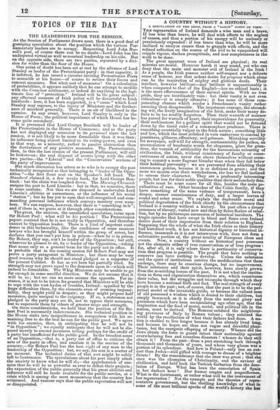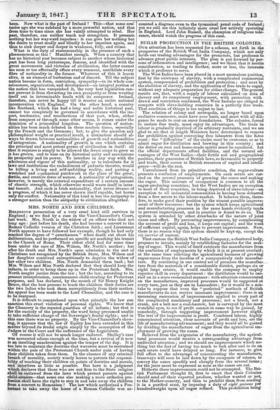A COUNTRY WITHOUT A HISTORY.
A SPECULATION ON THE IRISH, FROM A "SAXON " POINT OF VIEW.
THE regeneration of Ireland demands a wise man and a brave. If less wise than brave, he will deal with effects to the neglect of causes, and thus a portion of his energy will be uselessly or perniciously expended : if less brave than wise, he will be more inclined to analyse causes than to grapple with effects, and the refined reflection on the source of the evil to be vanquished will cripple vigour, slacken promptitude, and mar completeness in the work to be done.
The great apparent woes of Ireland are physical ; its real miseries are moral. However harsh it may sound, yet who can
deny that the main and monster evil of Ireland is the Irish ? As a people, the Irish possess neither self-respect nor a delicate sense of honour, nor that ardent desire for progress which alone can be the inspiration of mighty and glorious deeds. Their intellect, however brilliant—and brilliant it unquestionably is when compared to that of the English—has no ethical basis ; it is the mere effervescence of their animal spirits. With no true pride, they are inordinately vain : but their vanity is not even ridiculous—it is simply offensive ; it has none of those com- pensating charms which render a Frenchman's vanity rather amusing than disagreeable. The impetuous courage, the abound- ing wit, the lively imagination of the Irish, make their many de- fects to be too readily forgotten. Then their warmth of manner has passed for warmth of heart, their improvidence for generosity their recklessness for a gallant spirit that would not be fettered down by the timid rules of a commonplace prudence. There is something essentially vulgar in the Irish nature ; something little and low, which the most polished in vain endeavour to conceal by jauntiness, glibness, effrontery, and grimace. Mistaking servility for reverence, self-will for strength, sentimentality for pathos, an accumulation of bombastic words for eloquence, glare for gran- deur, the varnish of artificiality for the harmonious colouring of civilization, the Irish, without consistency of faculty or conse- cutiveness of action, never rise above themselves without seem- ing to commit a more flagrant blunder than when they fall below their habitual perversity : we are prevented from admiring their uncommon genius, because it is so deficient in grace ; and the more we mourn over their wretchedness, the less we feel inclined to esteem their character. They are a profoundly interesting people, but less for their noble qualities than their melancholy fate.
been. Now what is the past of Ireland ? This—that some cent tunes ago she was subdued by a more powerful nation, and that from time to time since she has vainly attempted to rebel. Her past, therefore, can neither teach nor strengthen. It presents nothing but her wayward impulses : it can give her nothing but the desire to trust madly and blindly to her impulses again, and thus to sink deeper and deeper in weakness, folly, and crime. What is the duty of statesmanship in the presence of such a phamomenon as this ? Manifest enough. When a country that has no historical past becomes subject to another whose historical past has been long picturesque, famous, and identified with the great movements and victories of civilization, the latter cannot too soon or too effectually efface every remnant, annihilate every fibre of nationality in the former. Whatever of this it leaves alive, is an element of barbarism and of discord. Till the subject nation become in form, conviction, sympathy—in its whole con- sciousness, organization, and development—an integral portion of the nation that has vanquished it, the very best legislation can- not prevent it from thwarting its own prosperity or from wearing itself out in interminable broils with its conqueror. Ireland, therefore, can never be happy till it receive an entire national incorporation with England. On the other hand, a country like Scotland, which has had a long and noble historical past, cannot too completely be governed in accordance with the im- port, tendencies, and recollections of that past, when, either from conquest or through some other means, it comes under the dominion of a primordial kingdom. The question of nation- alities has been much debated in these modern times, especially by the French and the Germans ; but, to give the question any philosophical weight or practical result, a distinction should al- ways be drawn between nationalities of growth and nationalities of antagonism. A nationality of growth is one which contains the principal and most potent germs of civilization in itself: all that it requires is simply to be allowed the freest scope to grow as it has grown, and to base on its historical unity and associations its prosperity and its power. To interfere in any way with the wholeness and vigour of this nationality, or to substitute for it laws and institutions the embodiment of pedantic theories, would be killing a living and self-unfolding reality, and putting a wretched and iffchanical patchwork in the place of the great, fertile, and creative force of nature. A nationality of antagonism, however, is merely the external expenditure of a certain amount of chaotic strength, which otherwise would waste itself in inter- nal tumult. And such is Irish nationality, that never dreams of a progress, of which it has never shown itself capable, but burns only for conflict. Nationality of this kind is less the antipathy to a stronger nation than the antipathy to civilization altogether.































 Previous page
Previous page